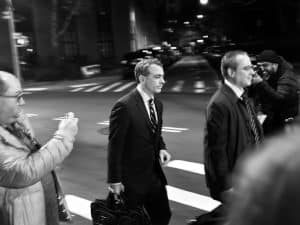Sam Bankman-Fried Trial: Recap, Legal Analysis, and What’s to Come

The landmark fraud trial against Sam Bankman-Fried came to a swift end Thursday night as the jury found him guilty on all counts after mere hours of deliberation.
Bankman-Fried’s parents broke down as the jury revealed their decision, while the defendant stood motionless facing the jury.
The disgraced FTX founder’s guilty verdict follows an intensive month-long trial which saw his former girlfriend, friends and roommates take the stand against him.
The Jury’s Perspective
“It was a very well-tried case by the government,” says former U.S. Assistant Attorney Kevin J. O’Brien. “The evidence was substantial… They had four cooperators from inside the company testifying that he was in charge and made all the key decisions.”
Originally slated to last for six weeks, the trial lasted around a month thanks to the prosecution reducing their arguments, which O’Brien calls “smart.”
“More importantly, from a juror’s point of view, you’ve got to understand what it’s like being a juror,” said O’ Brien. “They want to be home and enjoy their family again.”
“They kept it moving with a kind of rhythm,” O’Brien said of the prosecution. “They projected this air of confidence from the very beginning, and that is very appealing to the jury.”
Judge Kaplan, who had to encourage Bankman-Fried to answer questions directly numerous times throughout his testimony, “abetted” the government’s swiftness.
“He wouldn’t let the defense ask a lot of repetitive questions,” said O’Brien.
O’Brien notes that while the defense attempted to present seven witnesses originally, Judge Kaplan approved a request from the prosecution to block them all.
“The job of the defense lawyer is not to present a case. His job is to whittle away at the government’s case to create reasonable doubt,” said O’Brien. “And there was just no toehold to do that – there was just too much government evidence coming at them.”
Crucial testimony from former executives
O’Brien described Bankman-Fried’s testimony as “a last resort” following the government’s strong case against him.
Bankman-Fried faced an uphill battle from the beginning, with less than 1% of federal criminal defendants being acquitted in 2022.
“The last-minute decision to put Sam Bankman-Fried on the stand was probably the hardest that they had, but was probably the last resort to at least try and present a different narrative than what was already presented,” says Andrew Rossow, attorney and CEO of AR Media Consulting.
Throughout his testimony, the former ”king of crypto” often hesitated when fielding questions from the prosecution, saying he “didn’t recall” details pertinent to the case over 140 times.
“He didn’t come across that well based on reports,” O’Brien said. “He had problems answering questions directly and told a few lies and the jury picked up on it.”
Bankman-Fried deferred responsibility for FTX and Alameda Research’s collapse to former Alameda Research CEO, Caroline Ellison, arguing that Ellison’s failure to hedge the company negatively impacted it long term.
However, in her testimony, Ellison claimed Bankman-Fried was directly, saying he was the one “who set up systems to take customer money.”
Moreover, Ellison claimed she felt like an “unequal partner” in her romantic relationship with Bankman-Fried due to him being in a position of power over her at work.
“I would always ultimately defer to Sam,” Ellison said, elaborating that she had “concerns about the intersection of our personal and professional relationship.”
Despite Bankman-Fried’s deflection on the witness stand, O’Brien said “he was clearly the dominant partner.”
Similarly, FTX co-founder and chief technical officer, Gary Wang, and former head of engineering for FTX, Nishad Singh, testified that Bankman-Fried was the one who instructed them to add an “allow negative” feature on Alameda Research’s account on FTX’s database.
Prosecutors alleged that Bankman-Fried used it to fund political contributions, venture investments and real estate purchases, including a $35 million penthouse for the FTX founder and a select number of his employees.
Overall, Rossow stated that the defense did the best that they could in “trying to present some sort of second view based on the very, very damaging testimony that was almost impossible to refute.”
Moreover, Rossow believes that the “profound impact” of the co-conspirators’ testimonies “will play a very, very large role in whether or not they are getting the maximum punishment.
“I think there’s a good chance they won’t be sentenced to prison in at least a couple of cases,” O’Brien said.
What happens to SBF now
Mark Cohen, the defense attorney for Bankman-Fried, stated shortly after the jury returned that they planned to “vigorously fight the charges.”
The defense previously tried to argue that FTX’s now contested terms of service should be governed by English law given that FTX was headquartered in the Bahamas, however, Judge Kaplan ultimately ruled against it. It may be used as grounds for an appeal later on.
Additionally, the defense could potentially try to appeal based on Bankman-Fried not having access to his proper dosage of adderall during a portion of the trial. Previously, they alleged it prevented the defendant from “meaningly participating” in the presentation of his case.
The FTX founder is currently being held at Metropolitan Detention Center in Brooklyn where he is facing a maximum prison sentence of 110 years in jail for seven fraud charges including wire fraud, money laundering, and conspiracy. With Bankman-Fried’s sentencing for March 24th, 2024, it’s unclear just how long of prison term he will receive.
Referencing Bankman-Fried’s seven different fraud counts, Rossow noted that “they each have their own extreme punishments and prison time.”
Rossow believes “it would be hard for the court to be generous” considering the magnitude of the crimes committed.
However, O’Brien claimed that a hefty prison sentence would “essentially ruin” Bankman-Fried’s life.
“I think the argument’s going to be made that given everything he has to offer society, he should be given the opportunity to create a life for himself at some point,” said O’Brien.
“Sam Bankman-Fried perpetrated one of the biggest frauds in American history,” said U.S. Attorney Damian Williams during a press conference outside of Manhattan federal court Thursday night shortly after the verdict was announced. Williams stated that while crypto is a new industry, “this kind of fraud, this kind of corruption, is as old as time.”
“This is no different than anything that they had seen,” Rossow said. “It just took another form with a young adult that was leveraging new, emerging technology at the expense of others.”









